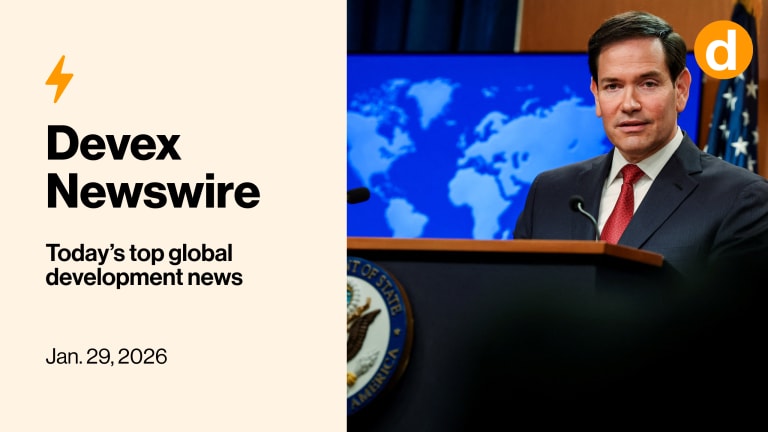
This is a time of rapid change — and immense opportunity — for the global landscape of development. Aid is no longer the primary source of development funds, as direct investment from the private sector and domestically mobilized resources continue to grow as sources of finance.
Yet the U.S. remains the largest single donor. Citizens around the globe are demanding more accountability from their governments and donors, thanks to easier access to more and better data and technology. And there is a call for greater ownership of development by partner governments and civil society. In this context, aid continues to be an indispensable tool of U.S. foreign policy and a strong expression of our moral, economic and national security imperatives.
Recognizing the importance of this moment, the Modernizing Foreign Assistance Network launched a policy paper last spring focused on how to make U.S. foreign assistance dollars, and the structures and policies that allocate and spend those dollars, work better. In it, we laid out our vision for “The Way Forward” on foreign aid reform, focusing on two powerful and mutually reinforcing pillars: accountability through transparency, evaluation and learning; and country ownership of the priorities and resources for and implementation of development.
These two pillars together help to create the conditions for developing country stakeholders to make smart decisions about their own development priorities and have the power to implement them — or hold donors and their governments to account when they don’t.
See more stories on U.S. aid:
● Will foreign aid survive as the US House divides over budget?
● Is OPIC too small to fail?
● Here's what US leadership in global development means today
● Which countries are winners, losers (and in-between) in Obama's 2016 foreign aid proposal?
● Obama's 2016 foreign aid proposal: the country-level data
In order to confront today’s challenges and bring about a more peaceful and prosperous world, U.S. foreign assistance policy needs to continue to be strengthened and modernized. While progress has been made, there is still much work to be done to institutionalize that progress and capitalize on emerging opportunities in 2015. While we recognize that partisanship and gridlock in Washington is at an all-time high, we have seen broad bipartisan support for reforming aid to ensure better and more sustainable results.
We will be looking to Congress to continue pushing legislative fixes to make sure, as Sen. Bob Corker recently said, that “American resources are used in the most effective manner possible.” Congressional leaders like Reps. Ted Poe and Ed Royce and Sens. Marco Rubio and Ben Cardin have championed bipartisan legislation on aid transparency and accountability, and we expect similar legislation to soon be introduced and pushed through Congress. Additionally, we have seen Congress rally behind the importance of making our international food assistance work better. Sens. Chris Coons and Corker reintroduced legislation earlier this year that would increase efficiency of U.S. food aid and allow us to reach millions more hungry people around the globe.
We will also be looking to the Obama administration to continue to demonstrate its commitment to prioritizing locally led development solutions, increasing aid transparency and ensuring the rigorous evaluation of programs. Under the leadership of Rajiv Shah, we saw the U.S. Agency for International Development develop the Local Solutions framework and implement a new evaluation policy. We hope to see continued support for Local Solutions and the importance of transparency and evaluation by Acting Administrator Alfonso Lenhardt and, once we have a nominee (hopefully soon!), the new permanent administrator. Additionally, USAID has been strengthened as a development agency through the resurrection of the Bureau for Policy, Planning and Learning and the Office of Budget and Resource Management, and we hope to see those important structural gains locked in.
Read stories from the series, Foreign aid effectiveness: A radical rethink:
● The illusion of control
● Betting on the poor
● The siren song of technical assistance
● Knowing our limits
● Old wine in new bottles
● Country ownership 3.0
● The path forward
The Millennium Challenge Corp. continues to be a leader on transparency, scoring very high marks the last two years on Publish What You Fund’s aid transparency index, and country ownership, one of its founding principles. Similarly, Ambassador Deborah Birx, the U.S. global AIDS coordinator, has put a huge emphasis on sustainable, locally led and transparent programs at the President’s Emergency Plan for AIDS Relief, creating a new sustainability index as part of PEPFAR 3.0 and local data hubs to drive evidence-based decision-making in partnership with MCC. The Department of State recently introduced an updated evaluation policy and continues to work on making ForeignAssistance.gov the true information dashboard it was intended to be, and we hope to see them continue to improve the quality and accessibility of foreign assistance data in order to ensure the United States meets its commitment to fully implement the International Aid Transparency Initiative by the end of this year.
Over the coming weeks, we will be doing a deeper reflection on our two pillar issues of country ownership and accountability and the specific actions we laid out in our policy paper that the U.S. government can take to strengthen foreign aid and development policy and practice. We will also look ahead to the opportunities to make progress on reform in 2015, both at the U.S. level and globally. We hope this series will spark a dialogue in the community about our recommendations, the progress we’ve made and the work that still needs to be done to embed key reforms as we look ahead to a new administration in 2016.
What’s the most important thing the U.S. government should do today to improve the effectiveness and efficiency of international development cooperation? Let us know by leaving a comment below.
Devex, in partnership with the Modernizing Foreign Assistance Network, is exploring the progress and potential of making U.S. foreign assistance more effective. To explore additional content, visit the Reform for Results website and tweet #Reform4Results.










